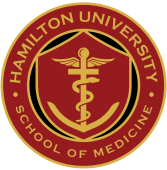Excellence in Medical Education and Global Health
At Hamilton University School of Medicine (HUSM), we are committed to shaping the future of healthcare through world-class education, innovative research, and a strong focus on global health equity. Our academic programs are designed to equip students with the clinical knowledge, leadership skills, and cultural competence needed to thrive in diverse healthcare environments across the globe. With a curriculum grounded in excellence, a faculty of distinguished professionals, and opportunities for global engagement, HUSM prepares future physicians and health leaders to make a meaningful impact—locally, regionally, and internationally.
A Global Approach to Medical Excellence
Our flagship MD program combines scientific rigor with clinical expertise to prepare physicians ready to practice anywhere in the world. Students benefit from our diverse faculty, state-of-the-art facilities, and international clinical rotations.
Medicine Program Highlights:
- A 4-year MD program.
- Early clinical exposure and problem and case-based learning beginning in the first semester.
- A medical education curriculum learning strategy that is Synergistic, Progressive, Integrative, Reinforcing, Adaptive, and Longitudinal.
- MD years 3 and 4 clinical clerkship rotations at affiliate teaching hospitals in the United States, Canada, UK and the Caribbean.
- Comprehensive USMLE and PLAB preparation integrated throughout the curriculum with adequate support, teaching aides and resources.
- Small student groups for problem and case-based learning, laboratory, clinical simulation and peer-based learning ensuring personalized attention and mentorship.
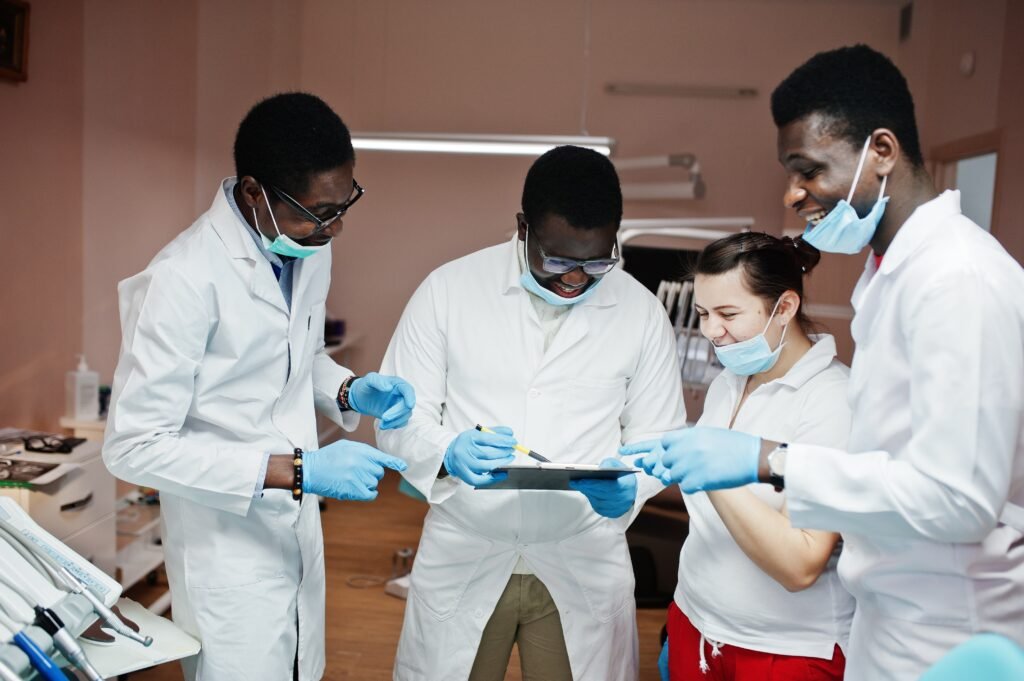
Curriculum Highlights
- Foundation Phase (Semesters 1-2): Building core scientific knowledge and fundamental clinical skills
- Development Phase (Semesters 3-5): Advanced biomedical sciences with increased clinical integration
- Clinical Phase (Semesters 6-10): Comprehensive clinical rotations in diverse healthcare settings
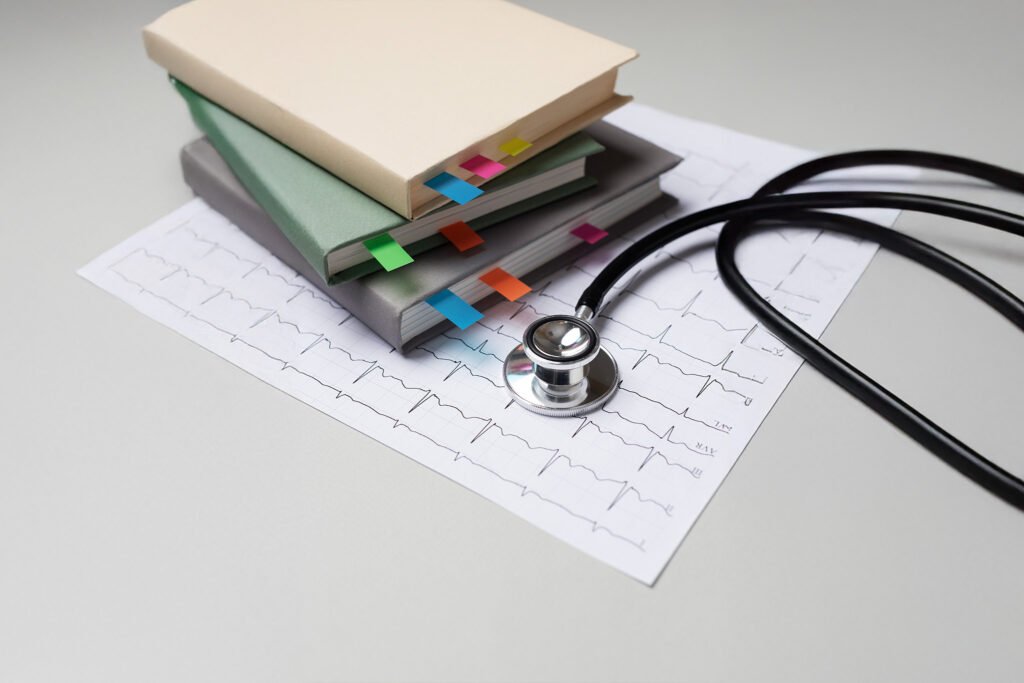
Curriculum Highlights
Phase 1: Basic Medical Sciences (Terms 1-6) – MD
- Phase Highlights:
- Early exposure to clinical settings and patient interaction.
- Problem-Based Learning (PBL) and Case-Based Discussions (CBDs) to integrate knowledge.
- Use of advanced simulation labs and digital learning tools.
Phase 1 equips students with the scientific knowledge, critical thinking skills, and professionalism required for successful progression into clinical training in Phase 2.

Phase 2: Clinical Sciences (Terms 7 – 12) – MD
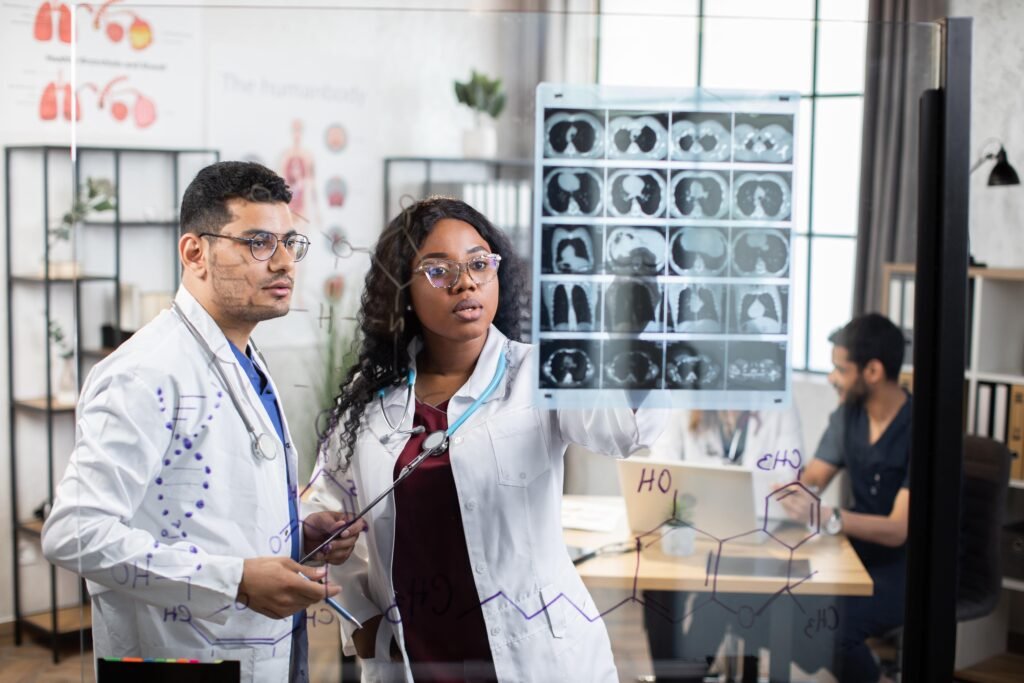
- Phase Highlights:
- Supervised clinical experience in diverse healthcare environments.
- Emphasis on patient-centered care, diagnostic reasoning, interprofessional collaboration, and leadership.
- Clinical skills assessments and Objective Structured Clinical Examinations (OSCEs).
- Preparation for licensure exams (USMLE, PLAB and HUSM OSCCE).
- Sub-Internship Experience
- Capstone Assessments
- Mentorship and Career Guidance
Phase 2 is designed to cultivate competent, compassionate, and confident physicians ready for postgraduate training and clinical practice worldwide.
Phase 3: Clinical Apprenticeship (Teams 13-15) - MBBS
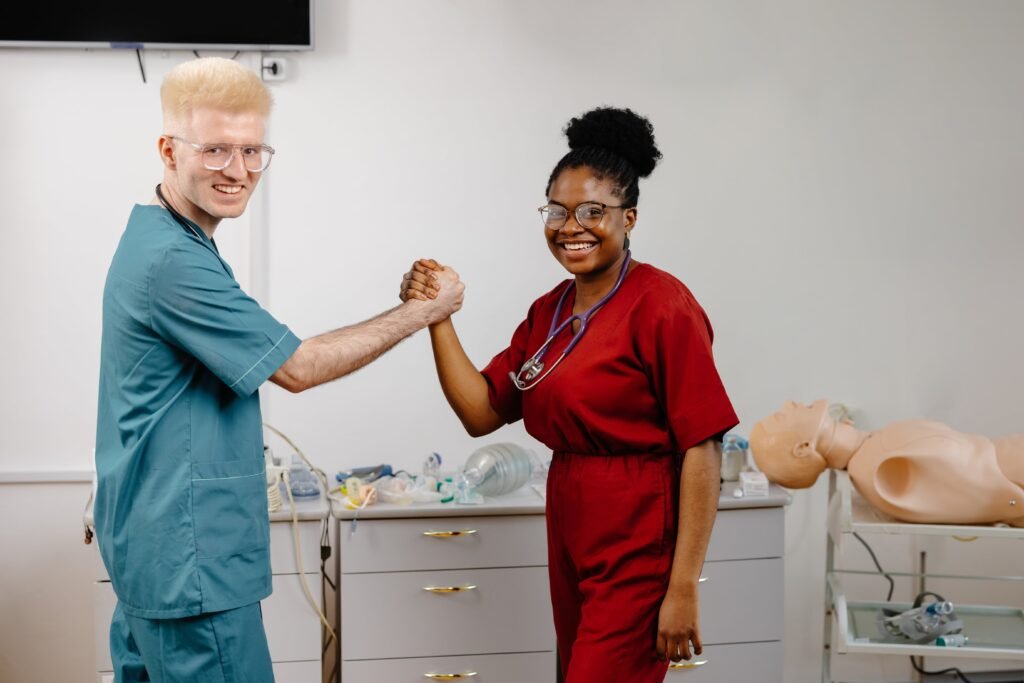
Phase 3 of the MBBS program is the final phase of undergraduate medical training, designed to bridge the gap between medical school and internship. This Clinical Apprenticeship phase provides students with an immersive, hands-on experience in real-world healthcare settings, emphasizing readiness for independent practice and community-based care. It ensures that MBBS graduates are practice-ready, equipped not only with the medical knowledge and clinical skills required for internship but also with the confidence, professionalism, and community orientation essential for effective healthcare delivery in diverse settings.
- Phase Highlights:
- Sub-Internship Experience
- Capstone Assessments
- Mentorship and Career Guidance
- HUSM OSCE for provisional medical licensing
- Rotations in Community Health Clinics and District Hospitals
Admission Requirements:
- General
- Personal Statement
- Letters of recommendation
- Multiple Mini-interviews (by invitation)
- Work Experience: Emphasis on applicants being able to show a commitment to caring which can be accomplished in a number of ways other than in a hospital or general practice setting, such as volunteering in an elderly care home, hospice, nursery or helping someone less fortunate. HUSM is also interested in individuals who have shown commitment to working as part of a team over a prolonged period of time in any area, including voluntary, sports, other extra-curricular activities.

- MD
- Admissions test: MCAT or UCAT (recommended but not an absolute requirement)
- Minimum GPA of 3.0 is recommended but a GPA of less than 3.0 can be considered along with other factors.
- Bachelor’s degree in a subject cognate to Medicine from an accredited university, or bachelor’s degree with a preliminary year in approved / affiliated university to obtain required credits in courses cognate to medicine.
- Preliminary year: Three of any subjects at A-level, IB or CAPE at grade B, 6, or II respectively or higher and satisfactory completion of a preliminary year in approved / affiliated university to obtain required credits in courses cognate to medicine.
- MBBS
- A-level: Three subjects with BBB or higher including Chemistry and one from Biology/ Human Biology, Maths or Physics; or
- International Baccalaureate (IB): Three subjects at Higher level at grade 6 or higher including Chemistry and one of either Biology, Physics or Maths; or
- CAPE: Three subjects at grade II or higher including Chemistry and one of either Biology, Physics or Maths; or
- India 10+2 exam: A minimum of 50% marks in PCB (Physics, Chemistry, and Biology) is required; or
- Preliminary year: Three of any subjects at A-level, IB or CAPE at grade B, 6, or II respectively or higher and satisfactory completion of a preliminary year in approved / affiliated university to obtain required credits in courses cognate to medicine; or
- Bachelor’s degree in a subject cognate to Medicine from an accredited university with a minimum GPA of 3.0
- Admission test: MCAT, UCAT or NEET-UG (recommended but not an absolute requirement)
Medicine and Global Health Programs
Medicine
Doctor of Medicine (MD) Program
A four-year graduate-entry program designed to prepare students for the United States Medical Licensing Examinations (USMLE), ECFMG Certification, US Residency placement and clinical practice in the United States, Canada, the Caribbean, and beyond. The MD curriculum integrates basic sciences, clinical training, and early patient exposure, supported by state-of-the-art simulation and research facilities.
Bachelor of Medicine, Bachelor of Surgery (MBBS) Program
A five-year undergraduate-entry medical program tailored for students entering directly from high school or pre-university and A-Level programs. The MBBS pathway combines rigorous academic training with hands-on clinical experience in accredited teaching hospitals. It prepares students for the UK Professional and Linguistic Assessment Board (PLAB) examinations, internship, and general medical practice outside of the United States without entering a specialist residency program. MBBS graduates are able enter US Residency Matching program after obtaining ECFMG certification under Pathways 1, 2, or 3.
Global Health
Certificate and Degree Programs in Global Health
These programs are designed for students and professionals seeking foundational or advanced expertise in global health. Topics include global disease prevention, health systems strengthening, health equity, and international health policy.
Dual Degree
MD (Doctor of Medicine/Master of Public Health)
This dual-degree program prepares students to address public health challenges alongside clinical care, integrating population health principles into medical practice.
MBBS/MPH (Bachelor of Medicine, Bachelor of Surgery/Master of Public Health)
Ideal for MBBS students interested in broadening their understanding of public health, this program combines medical training with interdisciplinary public health education.
Continuing Medical Education
Lifelong Learning for Healthcare Professionals
Hamilton University is committed to supporting the ongoing professional development of physicians and healthcare providers throughout their careers. Our continuing education programs offer flexible, relevant training to enhance clinical skills and knowledge.
Professional Development Courses
Available Programs:
- Tropical Medicine and Global Health Certificate (4 weeks)
- Emergency Medicine in Resource-Limited Settings (2 weeks)
- Healthcare Leadership and Management (online, self-paced)
- Clinical Research Methods (hybrid format)
- Medical Spanish for Healthcare Providers (online, 8 weeks)
Custom Training Solutions
We partner with healthcare organizations to develop tailored training programs addressing specific needs and challenges. Our faculty can deliver on-site or virtual training for medical teams and healthcare facilities.
Pre-Medical Foundation Program
Building the Path to Medical Success
Designed for students who need additional preparation before entering medical school, our Pre-Medical Foundation Program strengthens scientific knowledge and develops the academic skills necessary for success in medical education.
Program Features:
- Intensive coursework in biology, chemistry, physics, and mathematics
- MCAT preparation and test-taking strategies
- Introduction to medical terminology and concepts
- Academic skills development including critical thinking and time management
- Personalized advising and mentorship
Program Duration: 1-2 semesters (based on individual needs)
Outcome: Successful completion guarantees an interview for our MD program
Clinical Electives for Visiting Students
Global Perspective for Medical Students
We welcome medical students from other institutions to participate in clinical electives at our affiliated hospitals and clinics. These rotations offer unique exposure to tropical medicine, global health challenges, and healthcare delivery in resource-varied settings.
Available Electives:
- Tropical Medicine and Infectious Diseases
- Global Health and Community Medicine
- Emergency Medicine in Island Settings
- Primary Care in Underserved Communities
Duration: 4-8 weeks
Program
Accreditation
Hamilton University School of Medicine is committed to maintaining the highest standards of medical education. We are:
- In the accreditation process with relevant medical education authorities
- Recognized by the Turks and Caicos Islands Ministry of Health
- Developing partnerships with teaching hospitals across the Caribbean, United States, and Canada
Student Support Services
All Hamilton University programs include comprehensive support services:
- Academic advising and tutoring
- Career counseling and residency preparation
- Wellness programs and mental health services
- Financial aid guidance
- Housing assistance
- Global health and safety support during international rotations
